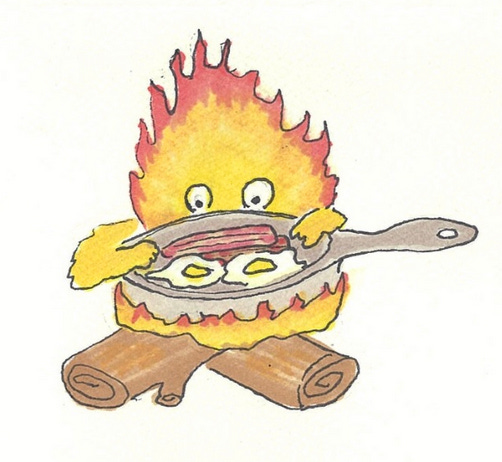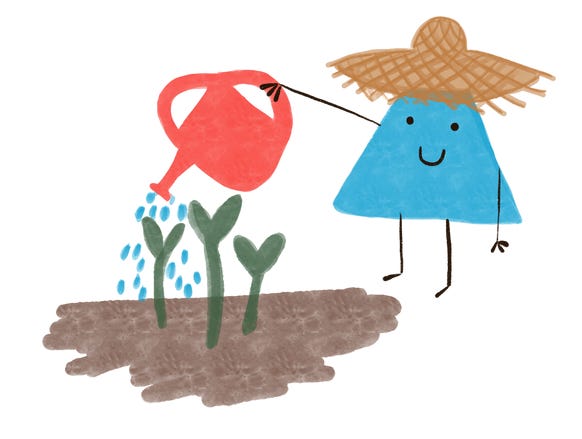When I think of the start of my artistic journey, I think of greeting cards. I was probably five or six, literate, but writing only with tremendous difficulty. My mom would sit me at the laminate kitchen island, colored an odd pale pink that doesn’t resemble any real stone known to man, and instruct me to make thank you cards for my aunts and uncles who had bestowed gifts on me, either for Christmas or my birthday.
I think I have always enjoyed drawing. Drawing, unlike writing, has always gotten me a positive response from friends and family members. Perhaps it’s the lack of commitment required to judge a drawing—the quickness of it. How long does it take to look at a drawing and say “wow, good job”? A much shorter time than it takes to read a novel.
So as a child, I painstakingly made hand-drawn thank you cards and used my stupid, ineffective baby hands to write the address and return address on the envelope. (The real cruelty was that the writing had to be legible.)
Anyway, this marvelous feat of child labor has resulted in an adult human who still makes note cards to thank people and has even branched out into other holidays. (It’s me—I’m the adult human.)
It took me a long time as an adult to try turning my art, which I’d been doing for ages, into more than just a hobby. I don’t know if you’ve been on Etsy or Instagram or Pinterest lately, but the world is really, really good at art.
My father, who can’t even draw a clock (he has Alzheimer’s), thinks that my drawings are literal alchemy. He likes all of them, even though he had noooo idea who Calcifer was that time I drew Calcifer for him as a Father’s Day card (my dad made me eggs every morning for breakfast, so I think of him when I think of Calcifer).
Anyway, my dad thinks my drawings are extra super special wonderful because of the Dunning-Kruger effect: Because my father can’t draw at all, he thinks anything I can draw is magic, because it is outside of his realm of expertise. I’m sure if I tried to make a candle (something my dad did for a long time), he would have criticisms in line with his experience.
So unfortunately, every time my dad said, “You should sell your art,” I thought I couldn’t simply due to the saturation of the market. (My god, have you seen what a 20-yo can do with Procreate these days?) But that was me putting technical expertise on a false pedestal as the only thing that mattered in art. There are other qualities that art can have that are just as valuable: How they make people feel, for instance. Or relatability.
Now that I’ve been selling cards for a year, I can say for sure that technical expertise is definitely not the only thing that sells art. It turns out that YES there is a market (at least locally) for my cards. People think they’re cute, and they inspire warm enough feelings that they buy some. I’ve even sold a couple on Etsy, which is extra super surprising because the market is saturated. There are thousands of other cards available for purchase there, and a couple buyers still chose my cards.
The Dunning-Krueger effect has two sides: One, that novices think you, as a medium-skilled person, are amazing, and two, that you, as a medium-skilled person, can see just how far away you are from making the art of your dreams. This, I assume, is where a lot of writers get their impostor syndrome from. Writers, being wide readers, will read the best writing to come out in a given year or decade and compare their own work to that standard. Which, like, yeah it’s nice to dream big, but it’s not really fair to yourself to dream so big that you only believe yourself successful if your work is meeting external qualifiers that are incredibly difficult to achieve. Only one person can win the Nebula award for Best Novel in a given year. Many great, even fantastic, writers will not. Same with bestseller lists—even if you make it on, there will always be some book that stays on longer or in a higher slot.
The best thing you can believe to keep yourself going is that your writing fulfills some niche that no one else’s work can quite exactly fill. Whether that’s because you’re writing something super sweet, or super queer, or super well researched, or something that speaks to a lived experience or folklore that isn’t seen much in mainstream media, or whether you’re hybridizing genres that haven’t yet had the pleasure of integrating—anything that’s even slightly different from the mainstream has value simply by not being the mainstream.
There is value in not being the Brandon Sandersons of the world. Obviously it would be more fun to have as much money as he has, or to have a whole team of people helping you write your book. Those things are definitely like, S-tier dream goals for many writers. But when it comes to imposter syndrome and thinking things like, “ugh, I’ll never be XYZ, so why even bother,” my point is that there are many reasons to bother. It is still valuable to be a writer who is not Brandon Sanderson.
When it came to selling my art, I always self-rejected thinking “well, no one will buy it because there is already so much OTHER art on the market.” But there will always be room in the market when it comes to art and writing. For every person who is head-over-heels in love with Sanderson’s work, there is another reader who is looking for something else, something different—something that maybe only you can provide. For me, in my art, it mostly seems to be dragons. Like, there are thousands of other artists making greeting cards, and even many who make cards with cute animals, but not too many who put dragons on their cards. And also, no one draws exactly like I do. Personal style is something that differs for everyone. I design my cards to inspire good feelings. They’re wholesome. Not everyone can recreate that.
And that’s what I’m saying about Sanderon’s work. His books have wide appeal because they are epic fantasy with hard magic rules. Many people like those things. But there are many things you can’t find in his work: Whole genres like historical fantasy or regency romance; LGBT protagonists; people of color with modern, real-world experiences. Not to mention even within the fantasy genre: Cozy fantasy, slice-of-life; worlds with soft magic that’s based more on whims or intuition. A writer who was not Brandon Sanderson could take the back cover copy of Mistborn and write a completely different work from that prompt. That is how different writers are with regards to style, interests, and experiences that they bring to the table.
So if you're feeling impostery--don't give up! You have something special to provide the world in your writing. Keep going! I believe in you!
#
As always, my cards can be found for sale on my Etsy. I also have an Instagram. I can also do custom and bulk orders.
Thanks for reading and Happy Spring!











This was a lovely read and very encouraging. Thank you 🥰
Thank you for this, Chelsea. You don't know how much I needed this affirmation this week. <3